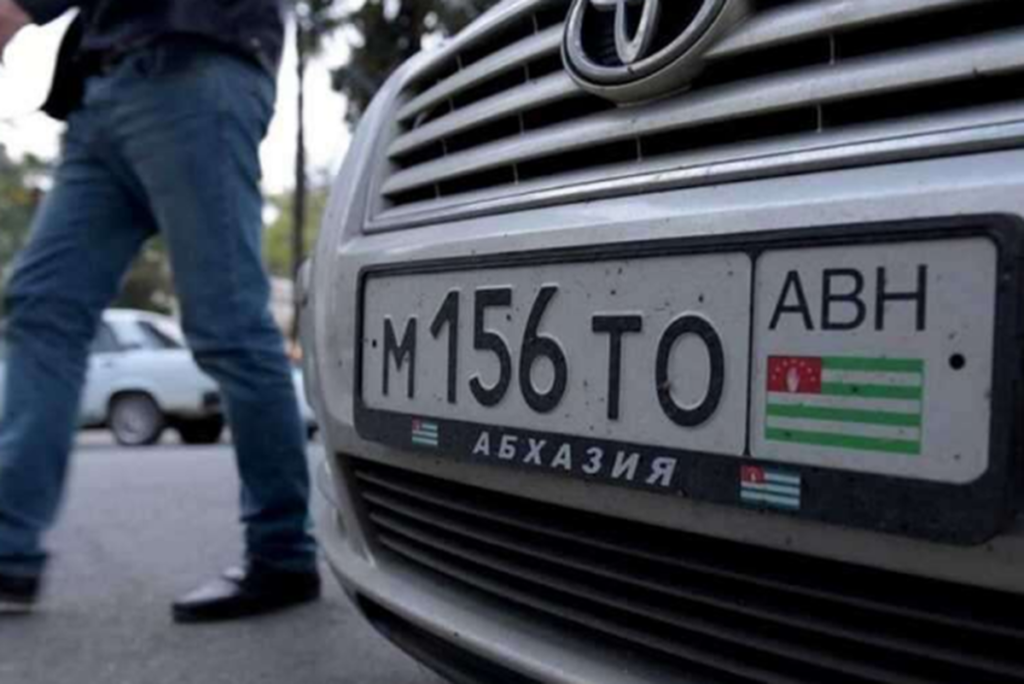As of May, all tourists driving into Abkhazia were expected to insure their cars. While this might save the government some headaches, some residents fear it could scare tourists away.
Alias Abukhba, a resident of Sukhumi, had toiled and saved for two years before being able to afford the car of his dreams, an Audi A6 — which was unfortunately totalled by an intoxicated driver only three days after he bought it.
‘It was the son of an official’, recalled Abukhba. ‘To get money [in compensation] from him, I had to negotiate for a long time with his family’.
Abukhba was eventually reimbursed for the damages — almost the entire amount he spent on buying the car.
This is customary for car accidents in Abkhazia; whoever is responsible for the accident pays for the repair of both cars, or even buys a new one for the victim if they were unsatisfied with the repair, or if the car was beyond repair.
Car insurance is not available to local residents and the police only show up if someone is seriously injured or dead. Even with police intervention, their tone shifts depending on who’s involved in the accident; bribery and nepotism are rampant, and even if someone goes to jail, they are liable to get out early.
Such peculiarities can be difficult for foreigners or tourists to adjust to. As a result, Abkhazian authorities made liability insurance for drivers of foreign vehicles compulsory.
It took Abkhazia more than four years to enforce this mandate since it was adopted by Parliament in 2018; a high-profile car accident involving Russian tourists in 2019 catapulted it into practice.
At the time, the Fedorov family, hailing from Krasnodar Krai, were visiting Abkhazia for a summer holiday in July when a driver drove into their car from the opposite lane.
The accident attracted mainstream coverage, and there was nary a journalist in Abkhazia who did not reach out to the Fedorovs for a comment. The hotel they were staying at even allowed them to remain for another two weeks free of charge to help them recover from the accident and to resolve the issue they had with the negligent driver.
However, since the rule came into force on 16 May, 36,000 cars that drove into the republic had been insured. Three state insurance companies were created to enforce this and to help tourists navigate the roads of Abkhazia.
‘This nullifies the contact between the tourist and the native’, Akhra Ketsba, deputy director of state insurance company Garant-Insurance, told OC Media.
If an accident suddenly occurs to a vacationer, the insurance company would be responsible for repairs, even if they were at fault.
The first group of tourists to benefit from state insurance were the Alekseevs, a family from Moscow. They had rented a car in Sochi at the beginning of June and got in an accident in Abkhazia where a local was deemed to be at fault.
‘We were driving towards Sukhumi (Sukhum) from Tkuarchali (Tkvarchel). We had 15 kilometres to the hotel but decided to turn around. We turned on the left turn signal, went into the oncoming lane, and then the driver of another car caught up with us from behind in the oncoming lane. He thought to overtake us but caught up and hit us,’ says Ilya Alekseev.
The family escaped with a slight fright, but the car couldn’t possibly go any further. Luckily, though, they had purchased insurance a short while before. They had learned about the new insurance mandate while already driving in Abkhazia, after being stopped by a traffic police officer in Gagra who instructed them to buy insurance.
‘‘We were stopped three times on the way, and they said that without insurance we would be fined’, said Ilya’s wife, Galina.
‘It costs a ridiculously low 1,000 ₽ ($18), for two weeks. In Russia, this is how much it costs to ensure a daily rented car’.
Had their car not been insured, it would’ve been unlikely that anyone would compensate either party for the damages, which amounted to more than 40,000₽ ($700).
Deterring accidents or tourists?
Today, even tourists who are already accustomed to driving in Abkhazia opt to buy car insurance; the Odintstovs, a family from Saint Petersburg , has consistently visited Abkhazia every year for the past ten years.
‘In the first year, the window in our car was broken and they tried to pull out the radio. Petrol was drained in the second year’, Alexandra Odintsova recalled. ‘For the third year, they tried to fine us for all conceivable and unthinkable violations. But all this did not scare us, but taught us the peculiarities of national driving, so to speak’.
‘Despite such, to put it mildly, features, we will continue to travel to Abkhazia, because the nature of Abkhazia covers all bases’, says Alexandra.
International insurance does not cover the territory of Abkhazia, and it must be bought locally. Some local tourism experts have warned that this, along with the insurance mandate, might deter tourists from visiting Abkhazia,
Additionally, all three state insurance companies have signed on with only one car repair shop to handle damaged tourist cars. Highly qualified mechanics are often in short supply, with locals having to wait for months to have their cars serviced by them.
However, Abkhazia’s insurance companies insist that the insurance mandate guarantees the safety of holidaymakers.
Moreover, the cost of insurance is paltry, and it helps the government create a specific budget for emergencies, as was the case in 2017, when an ammunition depot in the village of Primorskoye exploded, and the state had to compensate tourists for damages their cars had received.
For the time being, only tourists benefit from car insurance in Abkhazia, but there are plans to start ensuring locals.
For that to happen, several laws need to be adopted by the Parliament, and according to Garant-Insurance, this could take up to two years.
For ease of reading, we choose not to use qualifiers such as ‘de facto’, ‘unrecognised’, or ‘partially recognised’ when discussing institutions or political positions within Abkhazia, Nagorno-Karabakh, and South Ossetia. This does not imply a position on their status.




 26 August 2022
26 August 2022




